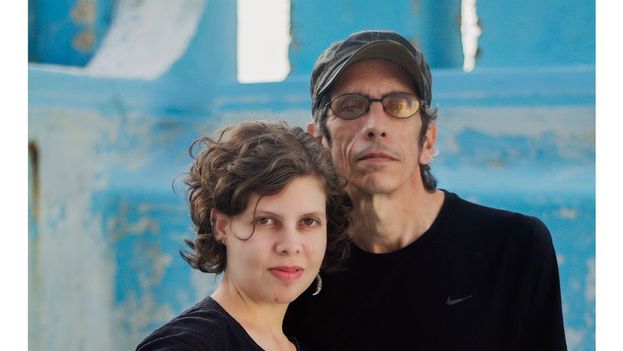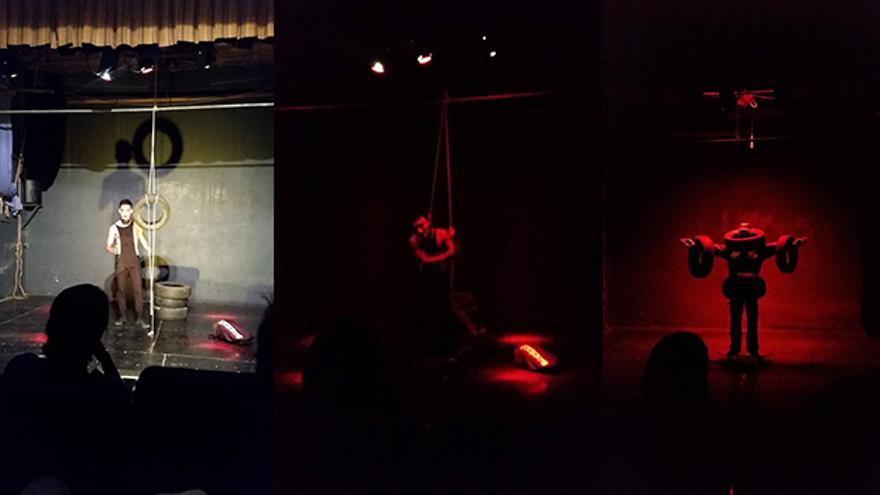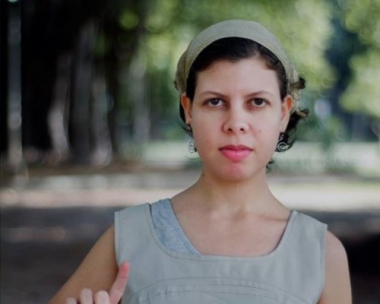I traveled with this work to the province of Santiago de Cuba to give performances on November 24 and 25. When I arrived, I received a phone call from a compañero in State Security asking me if I had received a police summons. I explained that I am out of Havana and he said he would call me as soon as I return.
On the day of the first performance in Santiago, a jury of censors belonging to the Provincial Council of Performing Arts and Party cadres from that province were waiting for me in the theater. They demanded to see the work before it was shown to the public. continue reading
After countless technical setbacks to staging the performance for the censorship commission, they finally decided to let the performances go forward but said: “This is a very difficult week since it commemorates the death of the
Comandante (Fidel Castro) and anything could be misinterpreted or taken as a offense to his memory.”
Despite how draining this situation was for the actor and the technicians, the performance went on as planned that night. However, the work was suspended by State Security the following day: it was November 25, the date on which Fidel Castro died.
On returning to Havana, I learned that the repression had also touched the capital. Those in charge of the Museum of Dissidence, Luis Manuel Otero Alcántara and Yanelys Núñez, were arbitrarily arrested and threatened. The police entered the house-galleryof the artists Luis Trápaga and Lia Villares where they planned to present The Enemies of the People, directed by the film director Miguel Coyula and written by the actress Lynn Cruz. In addition, they questioned artist-activist Tania Bruguera and her guests who were conducting the second stage of the Behavior Art Workshop.
On my second day in Havana, the Sate Security compañero calls me again, this time on my home phone. He summons me for a meeting at 5:00 in the afternoon at the police station on Cuba and Chacón, in Old Havana. Arriving at the station I am received by a boy in his mid-twenties, handsome and even kind, I could hardly believe it, I was expecting a troglodyte.
He leads me to the second floor of the station, an empty, cold and chilling place, nothing like the downstairs crowded with police, people and posters of the Revolution on the walls.
We entered a computer room where he introduced me to Lieutenant Colonel Carlos Muñoz, a middle-aged man. Then we go to the back of the room where there is a small office. I have to empty my pockets and remove my phone so I can not record the interrogation.
They want to know my relationships with other censored artists, warn me that Luis Manuel Otero, Yanelys Nunez, Lynn Cruz, Miguel Coyula, Lia Villares and Tania Bruguera are counterrevolutionaries, and that any link with them or their spaces would bring me problems. They warn me that my interests and needs as an artist are in danger because I see myself with these people disaffected with the Revolution.
The fundamental reason behind the citation was that a week before I spontaneously distributed a promotion for Cuba Decides at the press conference for the Biennial00, an independent event organized by the artist Luis Manuel Otero. They added the word “counterrevolution” again to describe the Cuba Decides campaign led by Rosa María Payá, whom they accused of being a “mercenary.” The whole time they tried to tear down the people who oppose the Castro regime, even demeaning the work of the opposition artists with ridicule.
The youngest of the State Security agents tells me that he had attended one of the performances of my work Hamlet Machine, that’s why his face was so familiar to me. Since when is State Security following me? They had done research among my neighbors, checked my Facebook wall and even had my phones tapped.
At the beginning of the interrogation I had shown myself before them, making jokes so as not to feel intimidated. After a few hours, all my defense mechanisms were dismantled. The fear arrived, the fatigue of revisiting the same subject, and apathy in the face of what I was hearing. All my energy collapsed.
In the end, what they wanted was for me to work for the Department of State Security (DSE) as an informant, to give them information about the censored artists with whom I relate, especially about Tania Bruguera. They wanted me to inquire about their sources of economic support because they said that someone abroad produced these dissident activities, a head that united the artists, activists and opponents against the Castro government.
If I complied with their request to be a chivato (snitch), and they would provide benefits for my theater group and they would give me a project within the National Council of Performing Arts (CNAE), where I would have a staff of actors and later an official headquarters.
They asked me to sign a document in which I committed to work for State Security. I asked that I be allowed to read the document, to which the lieutenant colonel replied “If you read it, you sign it.” Since the theater runs through my blood, I think of the most naive idea of all, to pass as a double agent and provide false information to State Security. I was playing in a scene that had nothing to do with fiction.
Finally, they take out the document, in which the heading, “Juramento” (Oath) is written in large letters, a word that made me back down. But it was too late or at least that’s how they made me feel. They had to change the paper, since the first one was stained with ink because my hands would not stop sweating because of nerves. I filled in the form, in which they asked me for for personal information and later I signed it.
Then the lieutenant colonel tells me that he is the one who attends the Book Institute and the other colleague would soon start attending the CNAE (Naitonal Theater Arts Council). They express their disagreement with the work Departures and with its director, Nelda Castillo, and ask me if I have any kind of link with her. They say that they will give me a kind of course where I would learn how to get information from people and they want me to tell them what plays have ideological problems. So the repression is beyond whether you are an independent artist or an artist who works for within an institution.
They say goodbye to me with an affectionate handshake, as if to let me know that I am part of them. Before leaving, they let me know that what we are talking about can not be communicated even to my pillow and they urge me to do theater that has nothing to do with politics. The interrogation lasted about four hours.
As soon as I am out in the street I think about everything. I see that playing double agent is not child’s play and how dangerous it can be. Of course working as a chivatón for Security goes against my principles, although they believe that being an artist, young and gay, I would be easy to manipulate. They were wrong. Because I would never betray my faith, devotion and respect towards art and artists.
We artists are and will be the true revolutionaries, we place our trust on a revolution of thought and work. We believe in freedom and respect for individuality, we believe in true democracy. We have faith in the change to come.
A few days ago, after telling all this to my friend the actress Lynn Cruz, she sent me this text message: “Adonis dear. Nobody remembers who governed in Spain when Cervantes wrote Don Quixote, but everyone knows who Don Quixote is. Governments happen but art is forever. Judas believed that betraying Christ was the thing of a single day, and you see what happened. These are moments of definitions, create, write, do work, defend your theater, resist like Carlos Celdrán, Carlos Díaz, Nelda Castillo. They all started in the rooms of their homes. The force is not in the body, but in the wonder of the minds. Live art forever! I love you so much. Work for yourself and your art.”
————————
The 14ymedio team is committed to serious journalism that reflects the reality of deep Cuba. Thank you for joining us on this long road. We invite you to continue supporting us, but this time by becoming a member of 14ymedio. Together we can continue to transform journalism in Cuba.

![]() 14ymedio, Havana, 4 February 2018 — A police search of Havana’s independent El Círculo Gallery, managed by the activist Lía Villares and the painter Luis Trápaga, ended with the seizure of computers, cameras and video cameras, several hard drives, USB drives and cell phones.
14ymedio, Havana, 4 February 2018 — A police search of Havana’s independent El Círculo Gallery, managed by the activist Lía Villares and the painter Luis Trápaga, ended with the seizure of computers, cameras and video cameras, several hard drives, USB drives and cell phones.


